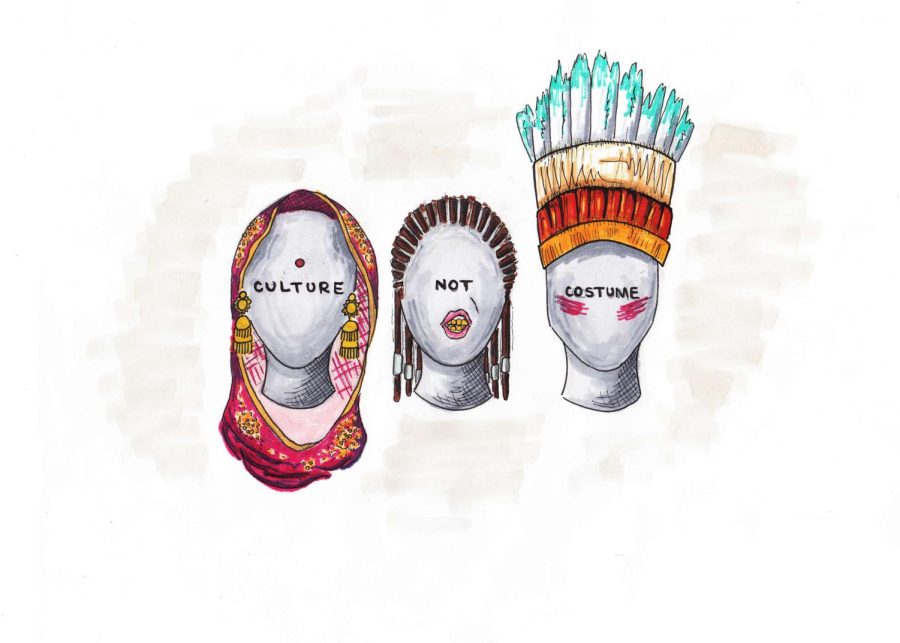Culture not costume
Drawing the line for appropriation during Halloween
photo courtesy of Creative Commons
Whilst putting together your final costume for Halloween night, it’s vital to acknowledge the possibilities of cultural appropriation and its relation to your outfit. Its a simple solution: Don’t wear costumes that exhibit a custom or tradition different from your own. This way everyone can enjoy a Halloween without perpetuating others’ culture.
October 31, 2022
As the leaves begin to fall and drift through the crisp cold air, you know that fall is turning the corner and Halloween is soon to come. However, as we begin to put on our thoughtfully articulated costumes, the idea of cultural appropriation begins to slip our minds. Regardless of the amount of candy you get at the end of the night, dressing in appropriative costumes, the most common of which include indigenous and Asian costumes, is unacceptable.
Children are frequently subjected to wearing these costumes without being aware of how they appear to others. Young children have yet to learn about cultural appropriation and the potential for controversy surrounding their costume, so they will wear whatever their parents dress them up in. It is their parents’ responsibility to ensure that their costume is appropriate and to educate their children on which costumes are and are not appropriate. Parents should take the initiative to explain the disrespect that occurs when their child imitates an offensive culture that is not their own.
There are some costumes, however, that appreciate certain cultures, ultimately creating a fine line between what is acceptable and what is not. For example, the popular Disney princess: Jasmine. It is fair and acceptable to dress up as your favorite princess; however, it is not acceptable to wear makeup to make your skin tone darker in hopes to appear more like Jasmine. Appreciating cultural differences is far different from mocking and making fun of them.
In recent years, it hasn’t been just the parents who are influencing culture-appropriative customs, companies such as Spirit Halloween and Party City have been most commonly associated with selling costumes targeting Indigenous, African American, Creole, Asian, Middle Eastern and Latin American cultures. This allows companies to profit off of misrepresenting entire cultures.
Many people that wear these costumes are painfully unaware of the harm they are doing by wearing them. Some think that these costumes are just a piece of fabric made for one-time use, but they are so much more than that. Once you start recognizing all of the forms of appropriation, the do’s and don’ts become apparent.
Blackface or any type of skin color disfiguration is a definite no. A cat, sure. A Geisha woman, nope. Marvel superheroes, go for it! A minion, why not! Any traditional clothing representing aspects of a specific culture not belonging to you, absolutely not. Traditional clothing pertaining to your culture, perfect.
I mean the list could go on and on, but just by asking yourself essential questions about the meaning, purpose and reason behind a costume, you can become more conscientious of your Halloween outfit’s impact. If the answer is that your attire will offend someone, finding something else is best.
Some may argue that it is just a Halloween costume and that people should not be “canceled” because of a tradition. But, inappropriate dress goes beyond that. These costumes are deeply rooted in oppression and racism, and they are used to mock or erase these groups’ true histories. It may end up perpetuating societal stereotypes and implanting an idea in one’s head that is not necessarily true. Dressing up in an offensive costume teaches others that similar behavior is acceptable in society and that mocking certain aspects of people’s culture or history is acceptable. Once one person sees it and thinks it’s appropriate, the never-ending cycle of cultural appropriation and offensive costumes continues.
I understand the joy and excitement that Halloween brings to people of all ages. You can dress up as anything you have ever dreamed of being. You can eat tons of candy without feeling judged. But there is a line that you should not be crossing. In order to set an example this year and the many to come, everybody should be perfectly capable of celebrating Halloween, without perpetuating cultural appropriation. The solution to avoiding this behavior seems simple when it comes to Halloween costumes: Don’t wear costumes that exhibit a custom or tradition different from your own.







